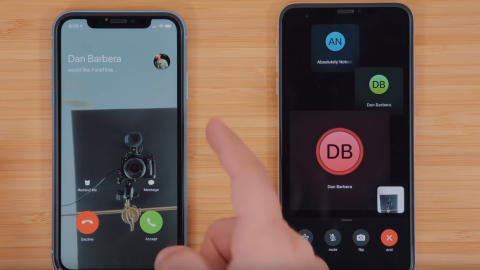FaceTime bug let users access the mic and camera on others’ phones

MacRumors via YouTube
- A FaceTime bug enabled iOS users to access the microphones and cameras on the phones of people they tried to call, even when those people didn’t answer.
- Apple has temporarily disabled parts of its services to make such eavesdropping impossible.
- In general, iOS tends to be the most secure of the popular mobile operating systems, but the recently discovered bug shows all systems have vulnerabilities.
A recently discovered bug in Apple FaceTime made it possible for users to hear live audio and video coming from the phone of the person they’re calling — even if the recipient didn’t answer the call.
An Apple spokesperson said the company is “aware of this issue and we have identified a fix that will be released in a software update later this week.” The flaw was reportedly discovered by a 14-year-old and his mom on January 20. In a video posted to Twitter, the two explain and demonstrate the bug.
Others have also replicated the bug.
The blog 9to5macexplained how it was possible to test the bug on any device running iOS 12.1 or later:
- Start a FaceTime Video call with an iPhone contact.
- Whilst the call is dialling, swipe up from the bottom of the screen and tap Add Person.
- Add your own phone number in the Add Person screen.
- You will then start a group FaceTime call including yourself and the audio of the person you originally called, even if they haven’t accepted the call yet.
What seemed to be happening was, after you’d added yourself to a group call, FaceTime immediately assumed a conference call had started and so it activated the recipient’s microphone. Worse, if the recipient chose to hit a button to “ignore” a FaceTime call, it seemed to activate the camera as well — all while the recipient remained unaware someone might be listening or watching.
On January 28, Apple temporarily disabled its server group that was running the group FaceTime feature, in what was likely a temporary fix for the bug.
Which is more secure: Android or iOS?
In general, iOS has long been considered the more secure of the two for one basic reason: Unlike Android’s (mostly) open-source system, iOS is a closed system that doesn’t share its APIs with developers. As such, the apps that make it to the App Store are vetted by the company, and so users tend to encounter fewer — but not zero — vulnerabilities, as security software company Sophos explains:
“…iOS isn’t 100% invulnerable. Recent examples, such as the iOS-based malware XCodeGhost have proven that iOS is vulnerable to malicious attacks as well.
Like Apple, Google provides a centralized market for mobile applications called Google Play. However, that is offset by the Android’s ability to install apps from third-party sources. Some are well-known and reputable such as Amazon. Others are not, and originate from malware hotspots in Russia and China. The criminal developers deconstruct and decompile popular apps like Angry Birds, and publish malicious versions and make them available for free.
The number of threats―especially on the Android platform―continues to increase.”
Other analyses suggest iOS is generally better in terms of responding quickly and effectively to vulnerabilities, as this comparison from SecurityLab showed.
Of course, the recently discovered flaw in FaceTime shows that sometimes security threats don’t come from malicious third parties, but from the provider itself.





